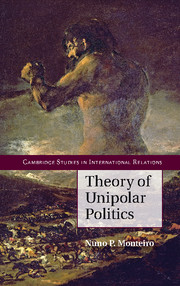Book contents
- Frontmatter
- Dedication
- Epigraph
- Contents
- Acknowledgments
- 1 Introduction
- 2 Conceptualizing Unipolarity
- 3 The Scope of Unipolar Strategic Choice
- 4 The Sources of Competition under Unipolarity
- 5 Competition in the Post–Cold War Era
- 6 The Sources of Conflict under Unipolarity
- 7 Conflict in the Post–Cold War Era
- 8 Conclusion
- Bibliography
- Index
3 - The Scope of Unipolar Strategic Choice
Published online by Cambridge University Press: 05 June 2014
- Frontmatter
- Dedication
- Epigraph
- Contents
- Acknowledgments
- 1 Introduction
- 2 Conceptualizing Unipolarity
- 3 The Scope of Unipolar Strategic Choice
- 4 The Sources of Competition under Unipolarity
- 5 Competition in the Post–Cold War Era
- 6 The Sources of Conflict under Unipolarity
- 7 Conflict in the Post–Cold War Era
- 8 Conclusion
- Bibliography
- Index
Summary
To say the world is unipolar is to describe the systemic distribution of power, not the strategy of the sole great power. In fact, the unipole's power advantage gives it considerable leeway in determining its strategic posture, unconstrained by any peer-competitors. When the world has a preponderant power, its grand strategy is the most important variable conditioning both the prospects for peace and the durability of a unipolar system. As we see in the following chapters, the unipole's grand strategy has a significant impact on the prospects of balancing by both minor and major powers and the type of interstate conflict. The grand strategy of the unipole is therefore an important variable mediating between the structure of international politics – in this case, a unipolar structure – and the most important international outcomes in terms of conflict-producing and competition-inducing mechanisms.
Most of the literature on unipolarity – and indeed most of the debate on grand strategy in the United States – assumes that a preponderant power will one way or another always maintain its “systemic management” role. States, however, only engage in management tasks, such as guaranteeing the maintenance of the status quo, to the extent that doing so serves their own interests. This means the unipole may eschew any systemic management responsibilities if the costs of doing so are greater than the benefits it extracts from its position of power preponderance. Therefore, unipolarity does not predetermine the maintenance of a strategy by which the preponderant power remains engaged in the world but restrained in the use of its power advantage. To the contrary, a unipole may choose to revise the status quo further in its own favor – or it may disengage from the world.
- Type
- Chapter
- Information
- Theory of Unipolar Politics , pp. 63 - 77Publisher: Cambridge University PressPrint publication year: 2014



